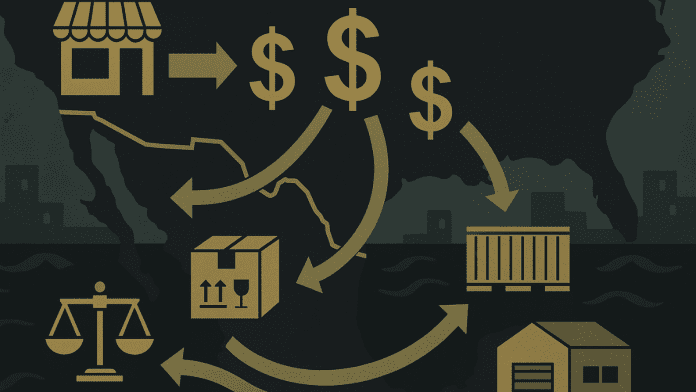Two Mexican nationals have been sentenced to prison in the United States for playing major roles in a complex money laundering conspiracy tied to powerful drug cartels. Using a method known as the Black Market Peso Exchange, the pair helped move millions of dollars in drug money from cities across the U.S. into Mexico, all while avoiding the need to physically transport cash across the border. The operation, masked as ordinary trade, funneled illegal funds through stores in Texas and into the hands of cartel-connected businesses in Mexico.
Millions in Drug Money Laundered Through Texas Businesses
Mauricio Anzures-Zarate, 53, from Mexico City, and Beatriz Salcedo-Carreon, 63, from Guadalajara, were sentenced by U.S. District Judge Keith P. Ellison to 55 months in federal prison each. They were part of a two-year conspiracy that disguised drug trafficking profits as legal business transactions. Instead of smuggling cash, the network used legitimate-looking goods to hide the illegal money trail.
The scheme worked like this: couriers collected drug profits from several U.S. cities and delivered the funds to Laredo, Texas. There, stores accepted the money as payment for merchandise. These goods were then exported to Mexico, where businesses paid for them in pesos. But instead of using proper banking systems, the pesos were secretly redirected to people affiliated with drug cartels.
This allowed the cartels to receive their profits safely in Mexico without drawing attention. The transactions appeared legal on the surface, but behind them was a highly organized effort to launder dirty money using trade.
Europe strikes back: new anti-money laundering agency AMLA launches to crush dirty money networks
Prison Time and Big Fines for the Offenders
As part of the sentencing, Anzures-Zarate was ordered to pay $1,176,165, and Salcedo-Carreon must pay $887,269. Both individuals were key players in organizing the flow of money through the system. They coordinated the collection of cash, guided instructions to Mexican companies, and helped disguise the illegal funds as normal business revenue.
Eight other individuals involved in the same conspiracy had already been convicted and sentenced. This sentencing brings more closure to a long-running case that touched cities across the U.S. and reached deep into Mexico’s cartel infrastructure.
The criminals made use of a tactic known as the Black Market Peso Exchange, a well-known money laundering technique where U.S. dollars from drug sales are exchanged for pesos through black-market brokers. These transactions are designed to appear as legitimate imports and exports, but the real purpose is to move cartel profits without alerting authorities.
Federal Agents Uncover and Dismantle the Operation
The case was uncovered through the combined efforts of the Drug Enforcement Administration (DEA) and the IRS Criminal Investigation (IRS-CI) unit. Acting Special Agent in Charge William Kimbell of the DEA’s Houston Division said the investigation delivered a major hit to the financial networks that keep drug operations running.
Lucy Tan, Acting Special Agent in Charge of IRS-CI’s Houston Field Office, emphasized how the suspects tried to hide behind legitimate businesses. She said that greed always leaves a trail—and in this case, that trail led directly to the cartels.
U.S. Attorney Nicholas J. Ganjei for the Southern District of Texas called the operation a threat to lives on both sides of the border. He noted that removing the financial arm of a drug cartel is just as important as stopping the drugs themselves.
Matthew R. Galeotti, Acting Assistant Attorney General for the DOJ’s Criminal Division, said the laundering scheme enabled the continued spread of deadly narcotics throughout U.S. communities. He praised the collaborative efforts that brought the criminals to justice.
The Justice Department’s Office of International Affairs and its Office of Judicial Attaché in Bogotá, Colombia played a key role in coordinating with Mexican law enforcement to secure the arrest and April 2024 extradition of Salcedo-Carreon.
Trial Attorneys Keith H. Liddle and Stephanie Williamson from the Money Laundering and Asset Recovery Section (MLARS), along with Assistant U.S. Attorneys Lance Watt, Amanda Gould, and former AUSA José Angel Moreno, prosecuted the case.


